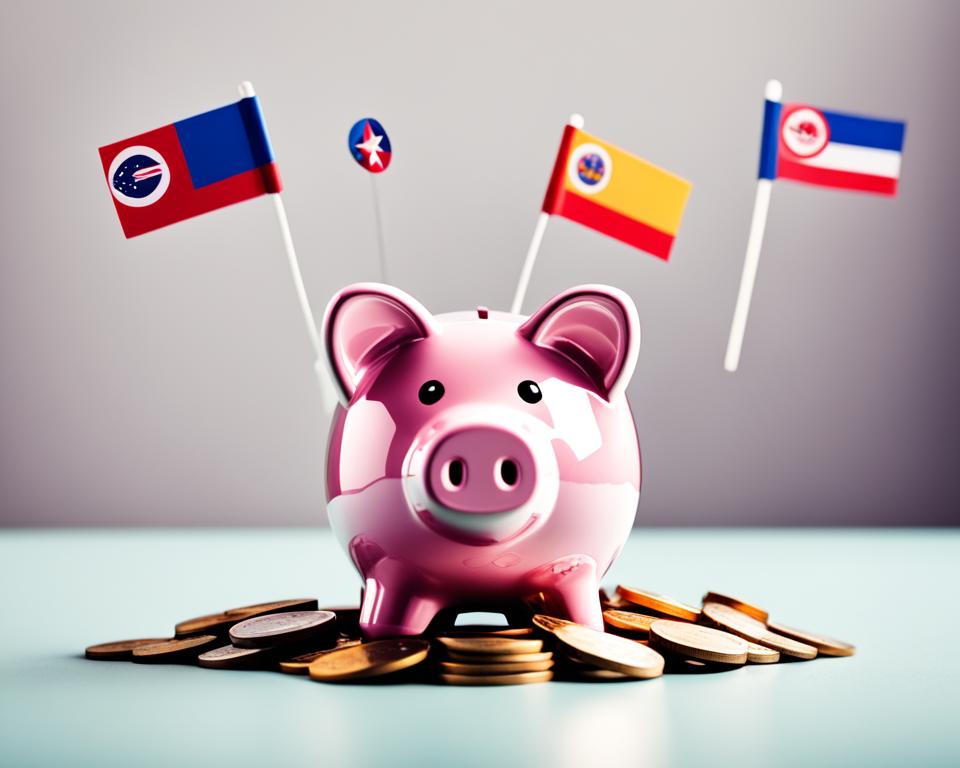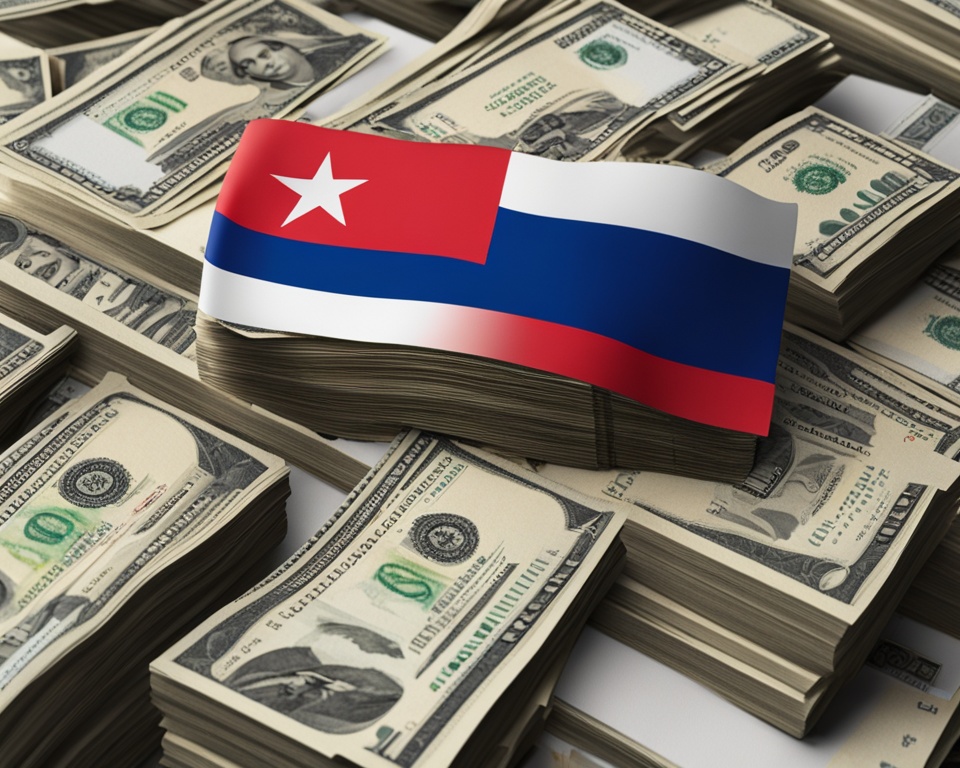
Paying Taxes on Interest Earned in Costa Rica.
Living in Costa Rica, American expats need to know about taxes on interest income. This is important for those with saving accounts, investments, or assets that earn interest. Understanding Costa Rican tax laws can be tricky. In this guide, we dive into the tax rules. We look at tax residency, foreign-earned income rules, and how to avoid extra taxes on interest income in Costa Rica.
Key Takeaways
- Individuals domiciled in Costa Rica are taxed on salaries, commissions, fees, royalties, and other forms of remuneration for services rendered.
- Foreign-domiciled individuals are subject to withholding tax (WHT) on interest income earned in Costa Rica.
- Costa Rican law entitles salaried employees to a mandatory Christmas bonus, which is exempt from income tax if it does not exceed one-twelfth of the net salary.
- Capital gains in Costa Rica are subject to a 15% tax, paid either through withholding at source or declared by the taxpayer.
- Interest income is generally taxed at a rate of 15%, unless it is considered part of the taxpayer’s regular economic activity, in which case it is taxed at a maximum ordinary rate of 30%.
Understanding Interest Taxation in Costa Rica
For expats and those aiming to boost their cross-border investment income, understanding interest income tax in Costa Rica is vital. Interest income comes from bank deposits, bonds, and similar investments. In Costa Rica, it’s usually taxed at 15%. But, if it’s part of your regular economic activity, the tax rate can be up to 30%.
What is Interest Income?
Interest income is money you make from bank deposits, bonds, and other investments. It’s different from money earned at work through salaries or fees. This money is considered passive income.
How is Interest Income Taxed in Costa Rica?
Costa Rica taxes interest income at a 15% rate if it is not from regular economic activities. But if it is part of your business, the maximum tax rate of 30% applies. Also, Law No. 10.381 has made some changes. Now, certain interest income from non-qualified entities in a multinational group faces a 15% tax. This widens the interest taxation scope for expats and those focused on international financial planning.

Do I have to pay taxes on the interest earned in Costa Rica
If you live in Costa Rica as an expat, it’s key to know about taxes on interest from investments or bank accounts. The tax system here says only local income is taxed. Yet, resident expats must pay taxes on their world wide income, including foreign interest.
Resident vs. Non-Resident Tax Obligations
For expats working here, if all income is from a job, usually you don’t file taxes. This is because your employer already takes out the taxes. However, Americans in Costa Rica must file taxes if they get other income. This includes money from their own business, rent, or any other income sources. If you’re a resident, you pay tax on all your income. Non-residents, though, pay tax only on local earnings.
Taxable and Non-Taxable Interest Sources
Interest from local bank accounts or investments is usually taxed at 15%, unless it’s part of your main economic activity. Offshore accounts or investments are not taxed. Because Costa Rica only taxes what’s earned within its borders.

Tax Rates for Interest Income in Costa Rica
In Costa Rica, interest income is normally taxed at 15%. But, this may change based on your situation. If this income is part of what you do for a living, the tax could be up to 30%.
Tax rates are different for people not living in Costa Rica. They pay a flat rate of 10%, 15%, or 25% on their earnings. This includes expat interest income tax and costa rican bank account interest taxation.
Understanding interest taxation in costa rica and offshore banking interest taxes can be hard. Getting advice from a tax pro is the smart move to follow the law.

Foreign-Sourced Interest Income
Living in Costa Rica as an American, knowing about tax on interest is vital. There’s no tax treaty between Costa Rica and the US. This can lead to double taxation on your Costa Rica-source income.
Double Taxation Agreements
If you earn interest in Costa Rica, you might pay tax in both Costa Rica and the US. This can be a big tax issue if both countries see you as a tax resident. It’s key to know your tax residency and the laws in both places to avoid paying taxes twice.
Foreign Tax Credits
You can use some strategies to lower US taxes on your Costa Rica interest income. The IRS has the Foreign Tax Credit and the Foreign Earned Income Exclusion. They can help lessen double taxation. Understanding and using these tax credits can make your tax burden smaller for non-resident interest income and interest tax laws in Costa Rica.
To make sure you’re following all the right tax rules, it’s smart to work with tax pros. They should know about costa rica tax on bank interest and interest tax exemptions for non-residents. By using these tips, you can handle your foreign interest income well. This can help you save on taxes and improve your financial life as an American expat in Costa Rica.
Reporting Interest Income on Costa Rican Tax Returns
If you’re living in Costa Rica, here’s what you should know. You must report your taxes to the US. This is true even if you’re living elsewhere. You also have to file a tax return in Costa Rica every year by February 15th. You need to report any money you’ve made in Costa Rica, as well as income from other countries. This annual income tax return is called the “Declaración de Impuesto sobre la Renta.”
Required Forms and Deadlines
More forms might also be needed, like the FBAR or Form 8938. You should use these to report any and you’ve done.
Make sure you know when all these forms are due. Otherwise, you might face penalties and interest.
Penalties for Non-Compliance
Not following tax laws in Costa Rica can be costly. You can get fined for handing in your tax declaration late. The fines are not small. If you pay your taxes late, there’s a fine too. This fine is charged every month that you’re late.
So, keeping good records and working with tax pros is crucial. This way, you make sure you’re on top of all your tax responsibilities. This goes for both the US and Costa Rica.

Strategies for Minimizing Interest Income Tax
Living as expats in Costa Rica, we can find ways to lower our interest income tax. One effective method is to use tax-efficient investment accounts. These include offshore banking and tax haven choices.
Tax-Efficient Investment Accounts
Choosing the right tax-efficient investment accounts can lessen our interest earnings tax. These accounts, usually in offshore banking and tax haven areas, offer better tax deals. Still, talking to tax professionals is a must. They ensure we follow the rules in the US and Costa Rica.
Offshore Banking and Tax Havens
Considering offshore banking and tax haven choices can be wise. They provide advantages like tax residency and double taxation agreement. This can lower what we owe for interest income. Understanding international tax planning helps us make the most of these options. We can keep more of our interest earnings.

Remember, these strategies need a good grasp of tax laws and regulations. It’s best to get advice from skilled tax professionals. They offer tailored guidance. This ensures we meet the tax needs for expats properly.
Conclusion
It’s important for American expats in Costa Rica to know about interest income tax. Costa Rica’s tax system is straightforward with low rates. Yet, expats still need to understand the tax rules in both the US and Costa Rica. This is to follow the law and pay the least amount of tax.
Working with tax experts and using smart financial plans helps manage tax on interest income in Costa Rica. This way, we can benefit from low taxes and follow all tax laws.
Call Now To Become a Private Lender Today
If you want to know more about how to handle interest income tax in Costa Rica, talk to a tax expert. They’ll give advice suited to your financial situation. With their help, we can earn more while reducing tax impact.
FAQ
What is interest income?
How is interest income taxed in Costa Rica?
Do I have to pay taxes on the interest earned in Costa Rica?
What are the tax rates for interest income in Costa Rica?
How do double taxation agreements and foreign tax credits affect interest income taxation for U.S. expats in Costa Rica?
What are the reporting requirements for interest income on Costa Rican tax returns?
What strategies can expats use to minimize interest income tax in Costa Rica?
Source Links
- https://taxsummaries.pwc.com/costa-rica/individual/income-determination
- https://www.greenbacktaxservices.com/country-guide/tax-guide-for-americans-living-in-costa-rica/
- http://www.costarica-embassy.org/sites/default/files/docs/TAX MATTER.pdf
- https://www.dentons.com/en/services-and-solutions/global-tax-guide-to-doing-business-in/costa-rica
- https://gapinvestments.com/en/faq/
- https://gapinvestments.com/en/costa-rica-investments/
- https://gapinvestments.com/en/inner-circle/
- https://www.taxesforexpats.com/country-guides/costa-rica/us-tax-preparation-in-costa-rica.html
- https://taxsummaries.pwc.com/costa-rica/corporate/tax-administration
Article by Glenn Tellier (Founder of CRIE and Grupo Gap)
